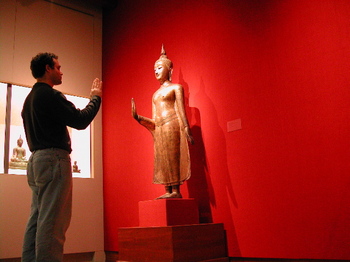The first time I heard of Bob Thurman it was 1984. I was in the small audience of the Amherst College Chapel for the first Inner Science Meeting. The Inner Science Meeting was the predecessor to the Mind and Life Meetings that have taken place since 1987 where His Holiness the Dalai Lama confers with Western scientists, philosophers, and practitioners. At the first Inner Science Meeting, the Dalai Lama lectured on Buddhist Psychology and his talks were interspersed by commentary from Western thinkers that included Robert Thurman, Richard Davidson, Frances Vaughan, Roger
Pelletier, Charles Tart, Bonnie Strickland, Renee Weber, Joshop Loizzo, Seymour
Epstein, and G. Perry. In 1984, His Holiness did not have the command of English that he has now and even now translating the intricacies and subtleties of Tibetan Buddhist Psychology of Mind are challenging. His regular interpreter had taken ill and Bob Thurman stepped into this gap. At this time, he was relatively new to Tibetan Buddhism and not yet ordained as a monk. There were many moments in the translation process where Thurman could not quite get what the Dalai Lama was getting at. His Holiness’s reaction? Anger? Frustration? Not at all. It was laughter, pure laughter. In a way this encapsulates Buddhism. While there is a rich and complex intellectual tradition and highly conceptual aspects (the Abhidharma, the Mind Only School, etc.) when it comes right down to the heart, concepts give way to laughter. Everyone was laughing and this laughter was a transmission of dharma. As a wide-eyed junior at Tufts University, this was an important transmission for me and my formal introduction to Buddhism. The fondness that burgeoned in me those two days planted to seeds that would later take root and flower in my finding the Dalai Lama in Bodh Gaya India and culminate in my taking the bodhisattva vows, but that is a story for another day. In the meantime, enjoy this brief talk by Robert Thurman. He picks up on the theme of interconnectedness that I discussed in the entry, “Her belly may be fully, but her spirit will be empty”

